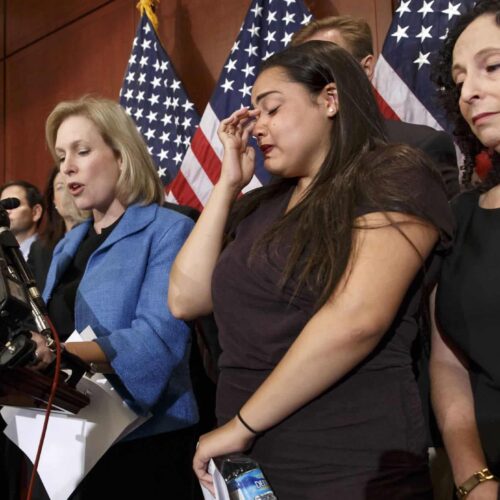Introduction
Lawmakers in both the Senate and House of Representatives are introducing legislation aimed at combating campus sexual violence this week, building on a series of recent federal initiatives aimed at tackling the issue — the focus of a landmark Center for Public Integrity investigation.
At a morning press conference attended by students and victims’ advocates, a bipartisan group of senators unveiled a bill designed, they say, to better protect those victimized by campus sexual assault, as well as to hold colleges and universities more accountable. Known as the Campus Accountability and Safety Act, the measure targets what the senators call “a scourge of sexual violence against students.” The group — led by Claire McCaskill, D-Mo., and including Kirsten Gillibrand, D-N.Y., Richard Blumenthal, D-Conn., Dean Heller, R-Nev., and Chuck Grassley, R-Iowa, among others — has been drafting the legislation for months, collecting information by hosting three Senate hearings for students and advocates, as well as conducting a survey of nearly 450 colleges and universities nationwide.
Following the event, Senator McCaskill said in a statement that “students need to be protected and empowered, and institutions must provide the highest level of responsiveness in helping hold perpetrators fully accountable.”
“That’s what our legislation aims to accomplish,” she stated.
In the House, Rep. Jackie Speier, a California Democrat, is today introducing her own bill, dubbed the Hold Accountable and Lend Transparency on Campus Sexual Assault Act, or HALT. That proposal represents the first of two anticipated pieces of legislation: this morning, Congresswoman Carolyn Maloney, D-N.Y., announced that, following the August summer recess, she will file a House version of the newly filed Senate bill.
(Update, August 1, 2014 at 1:23pm: Maloney’s office announced on July 31 that the Congresswoman had filed the House companion version before the August summer recess instead.)
“Sexual assault on our college campuses has reached epidemic proportions,” said Maloney in a statement. “And more must be done to address the ambiguities in the law, beef up protections, improve reporting, and strengthen enforcement.”
Two additional lawmakers — Barbara Boxer, D-Calif., in the Senate, and Susan Davis, D-San Diego, in the House — also introduced their own legislation to address the problem today. Known as the Survivor Outreach and Support Campus Act, this bill would require colleges and universities to establish an independent, on-campus advocate to support victims of sexual assault.
Of the two most substantive proposals, the House measure drafted by Speier’s office differs from the Senate bipartisan legislation in its language. But they share some common provisions. Among the most notable: a requirement for school administrators to conduct surveys on the scope of sexual assault on their campuses — a requirement recommended recently by a federal task force as well. The Senate bill, in particular, calls for making such annual surveys standardized and anonymous, and requiring schools to publish the results online.
Other key provisions aim to beef up the federal government’s own enforcement. For instance, the Senate and House measures would create more substantial fines and first-ever sanctions against colleges and universities for violating the Clery Act and Title IX, the two federal laws covering sexual assault on campus. The Senate bill would actually boost penalties for Clery Act violations from the current $35,000 per violation up to $150,000; for Title IX violations, it would institute sanctions equaling one percent of an institution’s operating budget. Both bills would also increase funding for the Education Department to hire more Title IX and Clery Act investigators, and force the department to make public all of its compliance reviews and settlements involving colleges and universities.
This new legislative effort is but the latest action on a variety of fronts to curb what everyone from President Barack Obama to Vice President Joe Biden to Education Secretary Arne Duncan has called an “epidemic” of sexual violence on college campuses. In April, a White House task force announced recommendations for helping colleges and universities respond to the problem, issuing new guidance and launching a new website. Within days, the Education Department released for the first time a list of every college and university currently under investigation for possible violations of federal law because of the way they have handled campus sexual assaults; so far, that list comprises more than 70 schools.
All of this comes just 15 months after the president signed into law yet another piece of federal legislation aimed at combating campus sexual violence, as part of a bipartisan renewal of the Violence Against Women Act: the Campus Sexual Violence Elimination Act, known as Campus SaVE, which will take effect this fall.
Much like that act, this new legislation is meant to address problems highlighted in an investigation of campus sexual assault by the Center for Public Integrity. Published in a six-part series starting in 2009, “Sexual Assault on Campus: A Frustrating Search for Justice” — done in collaboration with National Public Radio — showed that campus judicial proceedings regarding allegations of sexual assault were often confusing, shrouded in secrecy, and marked by lengthy delays. Those who reported sexual assaults encountered a litany of institutional barriers that either assured their silence or left them feeling victimized again. Even students found “responsible” for alleged sexual assaults often faced little punishment, while their victims’ lives were frequently turned upside down.
“The legislative proposals currently being considered by Congress deal more with the gaps in federal enforcement identified by the Center for Public Integrity,” said Daniel Carter, a long-time victims’ advocate now with the VTV Family Outreach Foundation. An original backer of Campus SaVE, he notes that its provisions are largely focused on institutional failures at the campus level.
“We haven’t seen the benefit of the Campus SaVE Act yet,” Carter adds. “These bills signify that campus sexual violence has become a top priority in Congress.”
He and other advocates who have worked for decades to highlight the prevalence of campus sexual assaults are delighted — and somewhat stunned — by all the national attention.
In a statement, Scott Berkowitz, of the Rape, Abuse and Incest National Network, who attended the Senate event, said: “We’re grateful that so many Senate leaders are working hard to solve the problem of rape on campus, and look forward to working with them to pass a bill that will help victims and help reduce the number of violent assaults.”
Read more in Education
Sexual Assault on Campus
Biden cites progress on campus sexual assault, but says there’s ‘so much farther to go’
Vice president highlights public awareness campaign in University of Illinois appearance


Join the conversation
Show Comments